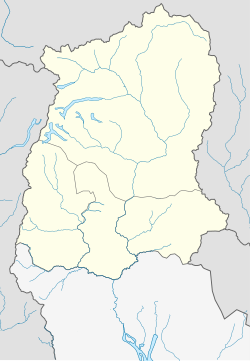Rhenock
|
Rhenock Rhenock रिनाक |
|
|---|---|
| city | |
| Location in Sikkim, India | |
| Coordinates: 27°10′N 88°38′E / 27.17°N 88.64°ECoordinates: 27°10′N 88°38′E / 27.17°N 88.64°E | |
| Country |
|
| State | Sikkim |
| District | East Sikkim |
| Elevation | 1,040 m (3,410 ft) |
| Languages | |
| • Official | Nepali (Gorkha), Bhutia, Lepcha, Limbu, Newari, Rai, Gurung, Mangar, Sherpa, Tamang and Sunwar |
| Time zone | IST (UTC+5:30) |
| PIN | 737 133 |
| Telephone code | 03592 |
| Vehicle registration | SK |
Rhenock (Nepali: रिनाक ) is a small town in the east district in the Indian state of Sikkim, located at 27°10′36″N 88°38′36″E / 27.176622°N 88.6432°E. It lies 63 kilometres east of Gangtok on the way to Jelepla Pass at an altitude of 1,040 metres. The word Rhe-nock (in Lepcha dialect) means Black Hill. Situated in the extreme east of Sikkim, Rhenock witnessed the establishment of the first police outpost in the state, which is the historical event.
Rhenock was covered with dense forest in and around the 13th century. The Lepchas were the early settlers about five or six hundred years ago. Middle of 16th century the Bhutias, migrated from Tibet settled in the villages presently known as Kyongsa, Aritar, Tarpin, Reshi and Chalisey. The people who settled were Gorkha ethnic groups such as Newars, Bahuns (Adhikari, Poudyal, Gautam, Dahal, Bhandari, Pokhrel and Achaarja), Chhetri (Subedi, Khatiwada & Bista), Gurung, Rai and Limboo.
Rhenock is inhabited by people of different ethnic groups such as Lepchas, Bhutias, Nepalis (Gorkhas), Biharis and Marwaris. Lepcha tribes who were early settlers have their own unique culture. Originally followers of Shamanism, they later became followers of Buddhism. Some of them are followers of Christianity. Bhutias are another group of tribes who are followers of Buddhism and who have their own identity and culture. The majority of the people are Indian Nepalis also known as Gorkha. Most of them are Hindus by religion. Some of the Nepalis Gurung after 1990 became Buddhist; before that they were followers of Hinduism. Some others are followers of Christianity. In spite of the above, everyone respects others' beliefs and faiths and celebrates others' festivals which makes a peaceful and prosperous society.
...
Wikipedia


